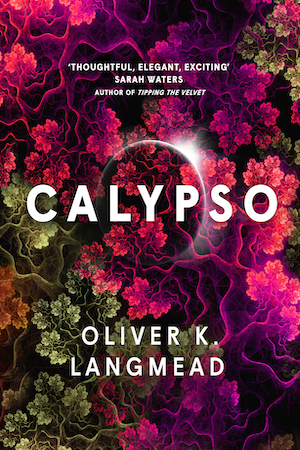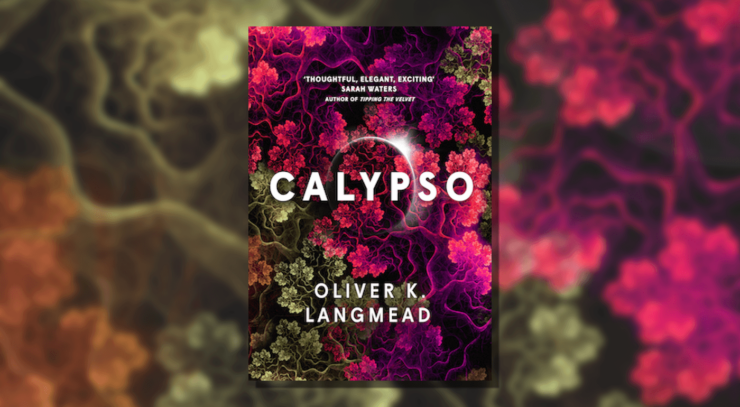We’re thrilled to share an excerpt from Oliver K. Langmead’s Calypso, a wildly imaginative work of eco-fiction written in verse—available from Titan Books.
Rochelle wakes from cryostasis to take up her role as engineer on the colony ark, Calypso. But she finds the ship has transformed into a forest, populated by the original crew’s descendants, who revere her like a saint.
She travels the ship with the Calypso’s creator, the enigmatic Sigmund, and Catherine, a bioengineered marvel who can commune with the plants, uncovering a new history of humanity forged while she slept.
She discovers a legacy of war between botanists and engineers. A war fought for the right to build a new Earth – a technological paradise, or a new Eden in bloom, untouched by mankind’s past.
And Rochelle, the last to wake, holds the balance of power in her hands.
Prologue
The Calypso is a grand cathedral;
When the sun is out, a hollow eclipse,
And after dusk, a glittering circlet,
Crowning the dark heavens; crowning the stars.
She is ordinary to my children;
Another satellite like our bright moon.
They were born and raised beneath her shadow,
And they will feel her absence when she leaves.
Benson collects patterned, coloured pebbles,
Ordering and categorising them
By which he judges worthy of keeping
And taking home as precious mementos.
Ciara creates castles in the gold sand,
Digging rivers and moats for the warm sea
Washing in waves over her feet and hands,
Erasing her fledgling kingdoms quickly.
I tell them to be careful, to stay close,
To make sure they avoid the jellyfish,
And let me know if they need more sunscreen.
All the things I think a mother should say.
I will never see my children again,
At least in this life. I will leave them soon,
I will sleep, and when next I awaken,
They will have lived their lives and passed away.
This holiday, to the Caribbean,
Is my way of trying to fix myself
In their memories, so that when they die,
They will know to wait for me in heaven.
I have been blessed enough to give birth twice,
And now I must pass that blessing along.
When I wake next, I will be a midwife,
Because the Calypso is expecting.
The Calypso will soon be a mother.
She is ready, and expecting to birth
Skies, and rivers, and trees, and animals.
The Calypso will birth a whole new world.
The Calypso feels like a new nation.
The crew are so young, it surprises me
That they have learned enough to keep us safe;
To navigate the perilous expanse.
I have always admired the stellar maps
The same way that I admire works of art;
All those curving lines, by which gravity
Informs flights. There are no straight lines in space.
Most of the engineers have chosen Earth
To look down upon, but I choose the stars,
As if I might catch a glimpse, in the dark,
Of glittering Luna, or distant Mars.
“Is this your first time off world?” asks Sigmund.
I don’t think he’s ever spoken to me
Before, and I’ve never seen him up close.
He looks much older than in the posters.
I am so nervous that I spill my charts
And our skulls nearly meet as we gather
The clear plastic sheets—a muddle of stars
And the elegant routes plotted through them.
I am clumsy in the new gravity
Of the Calypso, but so is Sigmund.
We lean up against the viewing window
And laugh together. He sounds nervous too.
“She will take some getting used to, I think,”
He says.“Is this your first time, too?” I ask.
“No. I’ve taken trips to Mars three times now.
She wears her green coat well, these days. Come see.”
Doctor Sigmund leads me to his office
By the hand, and I can feel him trembling.
There is a large brass telescope set up
And he bids me to see Earth’s greatest work.
In the dark between the stars I find Mars,
Her moons, all the shining ships in orbit;
And in a crescent of sunlight I see
A mirror of Earth: green and blue and white.
“Life, in abundance,” I say, and notice
Sigmund smiling in pride. He is old, yes,
But I think that his eyes are still youthful,
Set in among the deep lines of his face.
“Why do you think I chose you?” asks Sigmund.
“I’ve been wondering about that,” I say.
The rest of the engineers are different:
They don’t have the same kind of faith as me.
“You are my golden compasses,” he says,
And I don’t know what he means, but I smile.
“You must have read my articles,” I say,
“My research on colonial ethics.”
“I’ve read everything you’ve ever written.
You are an able theorist, Rochelle,
And I look forward to debating you.
I asked for you because we disagree.”
“About what?” “About almost everything.”
Sigmund leans, looks out through his telescope.
“You will be a voice of dissent, I hope.
You will have the courage to tell me ‘no’.”
The noise of the new crew echoes loudly
Through the corridors of the Calypso,
And I find myself wordless – uncertain.
“Thank you,” I tell Sigmund, eventually.
“Thank you,” I tell Sigmund, eventually.
I go out among the crew, and they sing
Songs about hope, about leaving Terra,
And I sing with them, and help where I can,
Because when I next wake, they will be gone.
I try to learn their faces and gestures,
So that I might see some semblance of them
In their descendants – the remnants of them
Passed down through the years and generations.
Soon, myself and the other engineers
Will go to our sarcophagi and sleep,
And God willing, we will wake and look down
Upon the face of a barren new world.
There is a kind of cleansing ritual
And we perform it alone, or in groups,
Undressing and washing away the Earth,
Rubbing the sacred oils into our skin.
When we are cleansed and ready, we’re led through,
Unashamed to bare all before the crew,
Because we will never see them again.
They sing what sound like hymns, or lullabies.
I go to my chamber, my small alcove,
Where awaits my bespoke sarcophagus,
Its smooth hollow the height and breadth of me.
There, I go down on my knees. One last prayer.
Today, I do not ask for anything.
I am simply grateful, and give my thanks
For the world I leave behind, its people,
Who, together, dreamt the great Calypso.
When I stand, the other sarcophagi
Are dark, their owners already asleep.
I am the last to leave the Earth behind.
A congregation of crew watch me rise.
They help me into my sarcophagus,
Smiling, reflecting the hope filling me
Like the preserving fluids through my veins;
Needling and burning and making me sleep.
Before the sarcophagus lid closes,
I think one last time about my children.
I hope they remember to wrap up warm;
It will be winter soon, and cold outside.
Excerpted from Calpyso, copyright © 2024 Oliver K. Langmead
Buy the Book


Calypso










